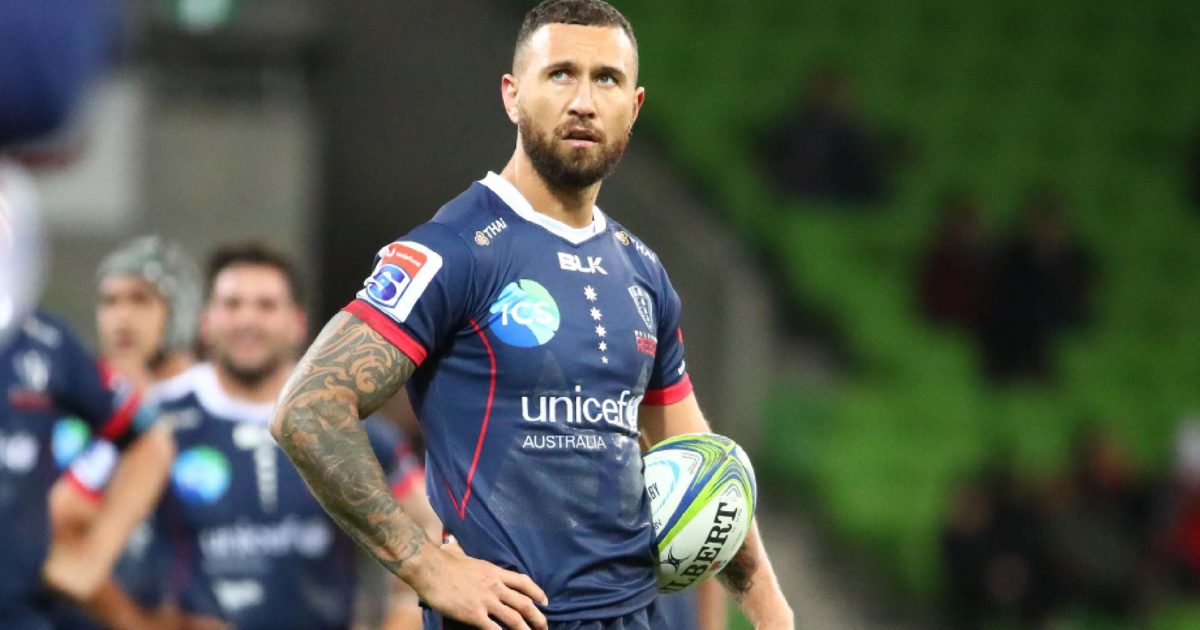'We would like that': Rennie wants Cooper back in Super Rugby

Wallabies head coach Dave Rennie has revealed he is eager for star playmaker Quade Cooper to return to Super Rugby after a two-year absence from the competition.
Speaking to media following confirmation that Cooper will end his four-year hiatus from test rugby this weekend, Rennie said having a player of his experience based back in Australia would be beneficial to the development of younger players around him.
Cooper hasn’t played Super Rugby since 2019 after he ended his one-year deal with the Melbourne Rebels to join the Hanazono Kintetsu Liners.
The 33-year-old veteran of 70 tests remains contracted to the Japanese club, but would be a highly-valued addition to any one of the Australian Super Rugby franchises as they struggle to keep hold of their top-line talent from offshore suiters.
The departure of Australia’s top players, combined with the lack of success endured by the Wallabies, has forced Rugby Australia to review its Giteau Law, which has enabled Cooper to remain eligible for Wallabies selection while being based overseas.
The Giteau Law stipulates that the only overseas-based players eligible for the Wallabies are those with at least 60 test caps and seven years of professional playing experience in Australia.
Key figures within the Australian rugby landscape have been left divided over whether those rules should be relaxed to allow the Wallabies to pick more, or any, overseas-based players from Australia.
Supporters of relaxing the Giteau Law believe doing so would strengthen the Wallabies, but critics have argued that would be to the detriment of Super Rugby, a competition of which the Australian teams are struggling in against their Kiwi counterparts.
Bringing Cooper back into Super Rugby could be a step in the right direction for Australia at Super Rugby level, though, and it would go against the ongoing trend of Australia’s top players leaving the competition.
That trend has continued this off-season, with the likes of Marika Koroibete, Brandon Paenga-Amosa, Isi Naisarani, Jack Maddocks and Jack Dempsey all confirming their exits to Japan and Europe.
Amid the continual raft of players leaving Australia’s shores, Rennie told reporters on Friday that he would welcome the recruitment of Cooper by any of the Australian Super Rugby franchises as he would prefer to keep his players domestically based.
“We want a lot of guys to come back, ideally,” he said ahead of his side’s Rugby Championship clash against the Springboks on the Gold Coast on Sunday.
Wallabies boss Dave Rennie has rejected suggestions that the selection of Quade Cooper against the Springboks was a panic move after three straight losses. #Wallabies #RSAvAUS #RugbyChampionship https://t.co/fTi1EXF7cO
— RugbyPass (@RugbyPass) September 11, 2021
“It’ll strengthen Super Rugby and help with a lot of young men that we have, playing with experienced players with experienced players at club level, so we would like that.”
Cooper would be no novice in Super Rugby given he was a key member of the 2011 championship-winning Queensland Reds team and made more than 100 appearances for the team between 2006 and 2017 before playing 16 times for the Rebels in 2019.
A move back to the competition would present new challenges for Cooper, though, as it has rebranded to Super Rugby Pacific following the additions of Moana Pasifika and the Fijian Drua in place of the South African, Argentine and Japanese teams.
During his time as Chiefs head coach between 2012 and 2017, Rennie came up against Cooper on numerous occasions when his side played the Reds.
Although this weekend’s test against South Africa will be the first time Cooper has played under Rennie, the Wallabies boss is well aware of the threats his recalled playmaker poses after having felt the full brunt of his talents as a member of the opposition.
“I mean we won it in 2012 and 2013, but we lost both years to the Reds and Quade carved us up both times,” Rennie said as he referenced his back-to-back Super Rugby titles in his first two years in charge of the Chiefs.
“It’s a wee while ago, obviously, but his ability to play on top of defences off quick ball and make smart decisions really stood out.
“I know he was enemy No 1 for a long time from the All Blacks supporters, but we’ve always had a lot of respect for his skill set.
“I’ve got to know him really well over the last few weeks. He’s grown up, he’s matured, he’s desperate for another opportunity, and we’re looking forward to seeing him wear the jersey again on the weekend.”
































































